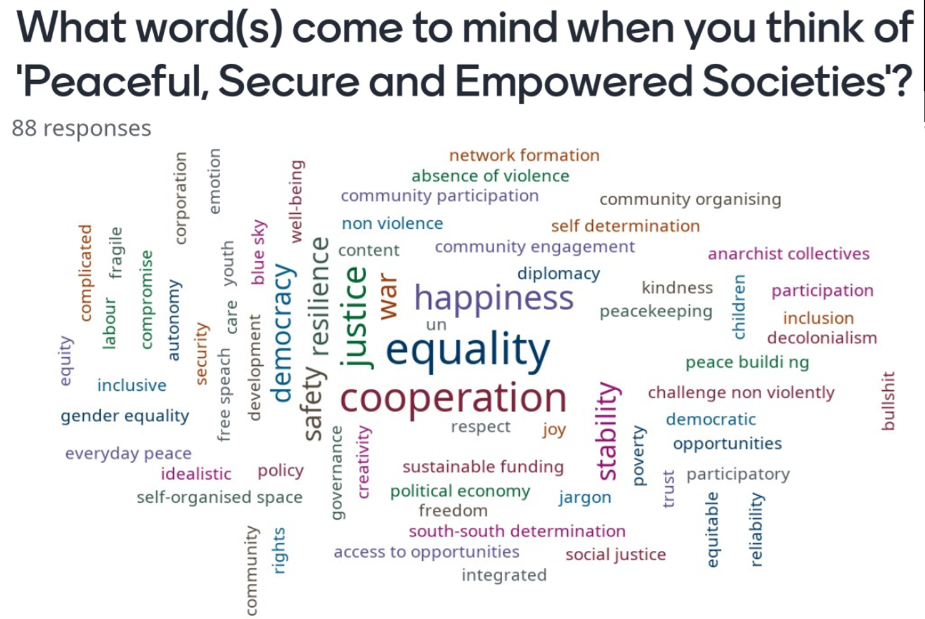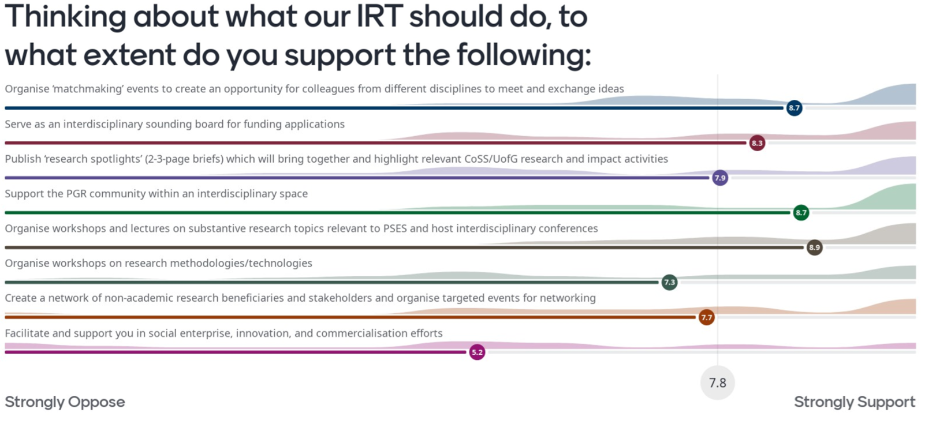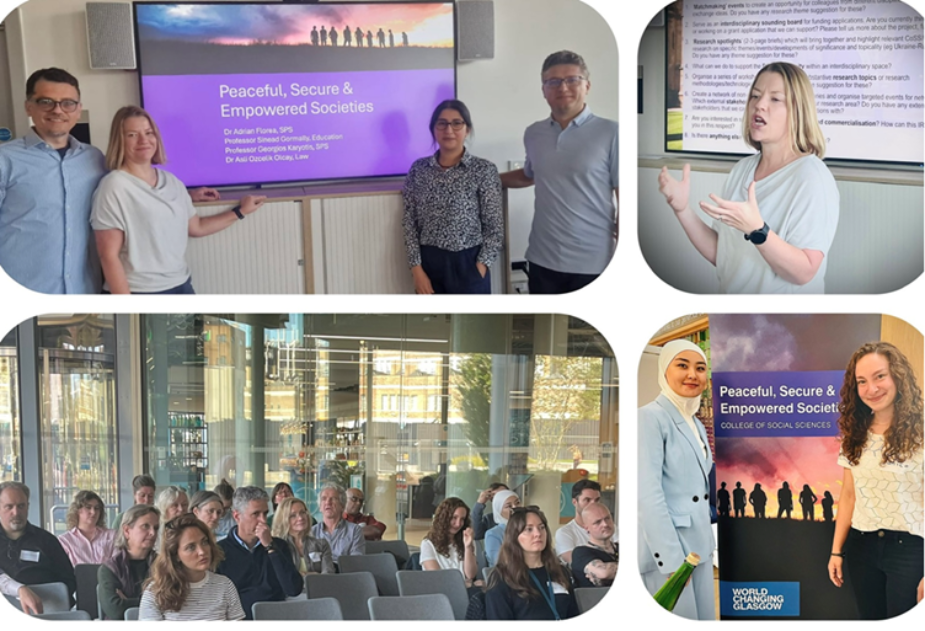Peaceful, Secure & Empowered Societies IRT Townhall Reflections
Published: 9 October 2024
The ‘Peaceful, Secure and Empowered Societies’ (PSES) IRT was successfully launched on Wednesday 18 September, with the active and joyful participation of about 45 researchers from the College of Social Sciences (CoSS) and beyond.
TOWNHALL REFLECTIONS:
Peaceful, Secure & Empowered Societies Launch Report
The ‘Peaceful, Secure and Empowered Societies’ (PSES) IRT was successfully launched on Wednesday 18 September, with the active participation of about 45 researchers from the College of Social Sciences (CoSS) and beyond. IRT leads introduced theme objectives, leadership and planned activities, inviting participants to shape – from the bottom up – the direction of the IRT for the next three years.

Mentimeter was utilised to capture views and preferences, starting with an ice-breaking word association question. ‘Equality’, ‘cooperation’, ‘justice’ but also ‘happiness’, ‘respect’ and ‘joy’ were some of the more prominent words that featured, among many others (see Figure 1).
Empowering CoSS Academics
We asked participants “What do you think the IRT should aim for, so that we could be more empowered as CoSS academics?” This broad, open-ended question provoked critical discussion and a wide range of responses. These could be grouped into four overarching themes, which nicely match the IRT’s stated objectives. To be empowered, you told us, the IRT should aim for the following:
1. Promote Collaboration and Networking > Corresponding IRT Objective: “1. Develop a research community & culture”
- Facilitate multidisciplinary exchange and collaboration;
- Interdisciplinary collaboration; Connecting scholars from across the University
- Collaboration with academics and social activists in peripheral countries
- Create a platform for connecting academics, entrepreneurs, civil society
- Fortifying network to integrate with other areas of research and technology
- Create space to be brave and take risks
- Social events to meet each other
2. Facilitate Funding Support >Corresponding IRT Objective “2. Support for research funding applications”
- Organise matchmaking funding events
- Peer review mechanisms
- Funding support
- Obtain small pots of money from the College
- Time, space, and resources for networking and ‘blue sky thinking’
- Writing retreat
3. Establish a Supportive and Inclusive Environment > Corresponding IRT Objectives: “1. Develop a research community & culture” and “3. Skills development & training”
- Mentorship and support for those with less experience
- Recognise the interconnections between research and teaching
- Sharing resources
- Understand deeply gendered differences and processes of building peace
- Accept different points of view; Informative dialogue
- Platform to post/share ‘research working papers/ideas
4. Promote Community Engagement and Impact > Corresponding IRT Objective: “4. External engagement & impact”
- Encourage engagement with local communities
- Sustainable and meaningful relationships with civil society groups
- Supportive policy recommendations
- Have affected stakeholders in the room
- Platforms and spaces to link academia, community, and policy technocrats
- Create spaces and support collaboration and knowledge exchange
- Practical implementation of ideas from the bottom-up
Strong Endorsement of PSES Plans
More specifically, we asked participants to express their level of support for some of the things we have planned, using a 0-10 scale (see Figure 2). Organising substantive research events (8.9) and ‘matchmaking’ events (8.7) relevant to our theme harnessed enthusiastic endorsement, as did our commitment to support the PGR community (8.7) and serve as an interdisciplinary sounding board for funding application (8.3).

Also strongly supported were plans to publish ‘research spotlights’ (7.9), create a network of non-academic research beneficiaries and stakeholders (7.7) and organise workshops on research methodologies/technologies (7.3). Facilitating entrepreneurship, innovation and commercialisation efforts within social sciences remains one of the ambitions of the IRT and the University, an area that some participants are more interested than others to explore (5.2).
Suggestions for PSES Events
The next question in our interactive discussions focussed on Events: “We will organise workshops and match making events on research topics or research methodologies/ technologies. Do you have any theme suggestions?” Five broad themes emerged from this discussion. Events about:
- Migration, Inclusion, and Community: Migration and host country inclusion; Migration and climate security; Community engagement; Community organising across contexts; Place-based approaches; Research with marginalised and hard to reach populations.
- Climate Change, Environment, and Health: Climate change as a driver of conflict; Energy and climate change; Armed conflict and climate change; Environmental emotions as a source of long-term resilience; Contemporary health and environment; grey spaces; Global health and conflict; Post-conflict health and well-being; Peace after disasters from natural hazards.
- Security, Conflict, and Peace: A workshop around conceptualising peace in different contexts; International order; Theories of (in)security; ontological security; The role of the West in arming/perpetuating foreign conflict; Authoritarianism; Resistance and peace activism.
- Economic and Social Inequalities: Economic inequalities; Exploitation of labour; Minority protection; National identity; Overcoming poverty; Human rights; International organisations such as UN; role of Scottish government.
- Research Methods: Research Practice Partnerships (RPPs - supporting co-creation of research with actionable research); Mixed methods; Creative methods; Intergenerational approaches; Address and challenge exploitative research methods through exploring authenticity and accountability.
Suggested Stakeholders
Finally, we asked participants “Which external stakeholders are most relevant to your research area? Do you have any that we can help you to establish connections with?”. Here are the three key themes that emerged and some examples of actors:
- Government and Intergovernmental Organisations (IGOs): Scottish government; UK government; The FCDO; Governments; The United Nations; NATO; WHO; WEF; policymakers and funding bodies.
- Non-state actors: Non-Governmental Organisations (NGOs); civil society; INGOs; Medical authorities and NGOs; Peace activist groups; Veterans Organisations; Social movements; industry; NGOs advocating for disenfranchised groups.
- Under-represented stakeholders: Indigenous scholars and activists; Global south scholars; Local politicians from southern periphery countries; Community and ‘Grassroots’ actors.

Reception
The drinks and canapes reception that followed allowed participants to chat with old friends, make new connections with early career and senior researchers from all Schools in the College of Social Sciences and collectively celebrate the launch of the new Interdisciplinary Research Theme promoting ‘Peaceful, Secure and Empowered Societies’ (PSES)! Thank you for joining us and we will take all your feedback on board!
First published: 9 October 2024
Shape the IRT
Please continue to shape the direction and evolution of the IRT by offering suggestions about activities and events, updating us on your interdisciplinary research plans and needs, and proposing ways to strengthen our community by completing the relevant form on the PSES website.

